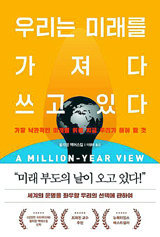'What We Owe the Future'
'What We Owe the Future'
Posted April. 22, 2023 08:08,
Updated April. 22, 2023 08:14

While typical mammalian species have endured for roughly a million years, humans possess the unique capacity for abstract thought, enabling us to plan for the future and potentially surpass the boundaries of other species. Although our sun has five billion years left to burn and our solar system will become inhospitable long before then, humans may find a way to persist if we can traverse the cosmos and settle among distant stars.
Will humanity progress, stagnate, regress, or face extinction as we forge ahead? Korean Zen Master Seosan Daesa once advised, "Walk with purpose, even on a snow-covered field, for the footsteps I take today will become the milestones for those who follow." In a similar vein, William MacAskill, author of 'What We Owe the Future,' advocates for "long-termism," prioritizing actions that positively impact our distant future as the most morally significant endeavor of our time.
The Scottish philosopher emphasizes that the future is not predetermined – the actions of a few can indeed create lasting change. Slavery is now considered an abhorrent sin devoid of value. However, according to the author, it once affected 10 percent of the human population since Homo sapiens first appeared. This changed through a serendipitous shift when the efforts of some Quakers in the 18th and early 19th centuries sparked the abolition of slavery. Despite the economic benefits that the slavery system generated, the change in values in people’s mindsets led to an enduring transformation that still resonates today.
The author contends that humanity must prepare for a brighter future by considering various scenarios, including the collapse of civilization due to climate change or nuclear war, human extinction caused by genetically engineered pathogens, and stagnation in technological development. The likelihood of these dire scenarios unfolding is greater than we might imagine. Designing and producing viruses at home could become a chilling reality as technology advances. Experts estimate a one percent chance of an extinction-level pandemic occurring this century.
"Effective altruism," a concept formulated by the author, involves systematically analyzing the consequences of our actions, has resonated with many. He likens the current state of the world to "molten glass,“ meaning, much like glass that has not yet solidified, our world remains adaptable, and no single value system has claimed victory. Once the glass hardens, it either shatters or remains unbroken. The fate of our world, poised to endure for ages to come, rests in our hands.
jjj@donga.com





![[속보]“하메네이 차남, 이란 차기 최고지도자로 선출”](https://dimg.donga.com/c/138/175/90/1/wps/NEWS/IMAGE/2026/03/04/133459477.1.jpg)

